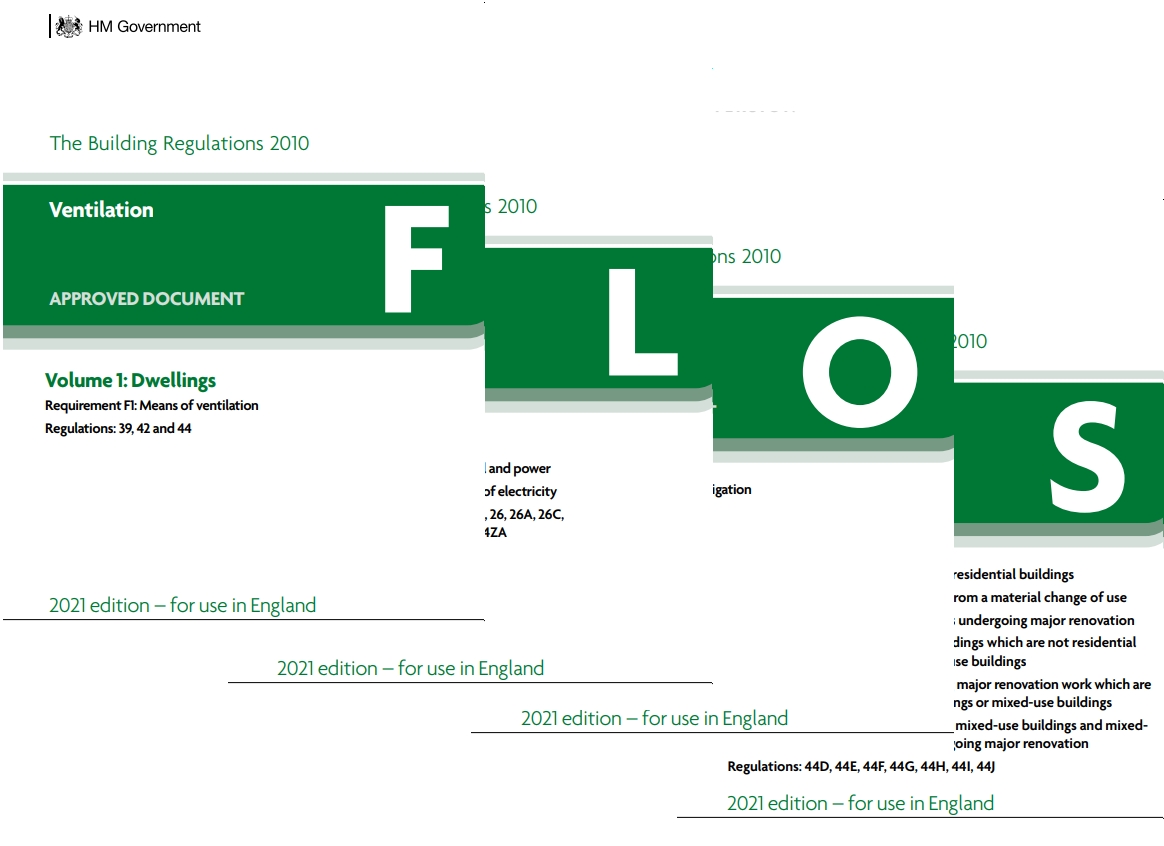15 June 2022 changes to Approved Documents

|
Contents |
[edit] Introduction
Changes to the Building Regulations came into effect for England and Wales from 15 June 2022 with the publication of new Approved Documents:
- Approved Document F, volume 1: dwellings.
- Approved Document F, volume 2: buildings other than dwellings.
- Approved Document L, volume 1: dwellings.
- Approved Document L, volume 2: buildings other than dwellings.
- Approved Document O: Overheating
- Approved Document S, Infrastructure for the charging of electric vehicles.
The changes follow the Government’s response to the Future Homes Standard consultation and are part of the plan to move to net zero by 2050. These are intermediate changes, with a detailed technical consultation for the Future Buildings Standard due to begin in 2023, and further changes to the building regulations in 2025.
The effect of the changes include:
[edit] Existing homes:
- A new minimum standard for fabric efficiency.
- A requirement that new or replacement heating systems can accept low-carbon heating in the future.
[edit] New homes:
- A 30% cut in emissions.
- Measures to mitigate the risk of overheating, with limits to the amount of glazing. Methods of compliance include a simplified method, based on the size and orientation of glazing relative to the floor area, and a dynamic method based on risk and mitigation.
- Adoption of the Fabric Energy Efficiency Standard, based on U-values, thermal bridging, external heat gain, and so on to measure energy efficiency.
- A maximum flow temperature of 55°C for new and replacement heating systems.
- Good practice specification for heat pumps.
- A requirement for charging points for electric vehicles.
[edit] Buildings other than dwellings:
- A 27% cut in emissions from new commercial buildings.
- New maximum U-values.
- Updated guidance on ventilation systems.
[edit] Transitional provisions
The new Approved Documents come into effect on 15 June 2022, but do not apply to works where an initial notice was registered before 15 June 2022, provided the work starts before 15 June 2023.
NB On 1 June 2022, changes to fire safety guidance and the building regulations were introduced to provide clearer fire safety rules for the design and construction of residential developments. The changes are intended to satisfy recommendations from Phase One of the Grenfell Tower Inquiry and will strengthen the information available to fire and rescue services. For more information see: 2022 changes to fire safety guidance and building regulations.
A government briefing about some of the changes is available at: https://assets.publishing.service.gov.uk/government/uploads/system/uploads/attachment_data/file/1057367/Circular_letter_Jan_2022.pdf
[edit] Related articles on Designing Buildings
- 2022 changes to fire safety guidance and building regulations.
- Approved document F.
- Approved document L.
- Approved document O.
- Approved document S.
- Approved documents.
- Building regulations.
- Carbon emissions.
- Changes to approved document L and new approved document O.
- Fabric Energy Efficiency Standard.
- Future Buildings Standard.
- Future Homes Standard.
- Net zero.
Featured articles and news
Scottish parents prioritise construction and apprenticeships
CIOB data released for Scottish Apprenticeship Week shows construction as top potential career path.
From a Green to a White Paper and the proposal of a General Safety Requirement for construction products.
Creativity, conservation and craft at Barley Studio. Book review.
The challenge as PFI agreements come to an end
How construction deals with inherited assets built under long-term contracts.
Skills plan for engineering and building services
Comprehensive industry report highlights persistent skills challenges across the sector.
Choosing the right design team for a D&B Contract
An architect explains the nature and needs of working within this common procurement route.
Statement from the Interim Chief Construction Advisor
Thouria Istephan; Architect and inquiry panel member outlines ongoing work, priorities and next steps.
The 2025 draft NPPF in brief with indicative responses
Local verses National and suitable verses sustainable: Consultation open for just over one week.
Increased vigilance on VAT Domestic Reverse Charge
HMRC bearing down with increasing force on construction consultant says.
Call for greater recognition of professional standards
Chartered bodies representing more than 1.5 million individuals have written to the UK Government.
Cutting carbon, cost and risk in estate management
Lessons from Cardiff Met’s “Halve the Half” initiative.
Inspiring the next generation to fulfil an electrified future
Technical Manager at ECA on the importance of engagement between industry and education.
Repairing historic stone and slate roofs
The need for a code of practice and technical advice note.
Environmental compliance; a checklist for 2026
Legislative changes, policy shifts, phased rollouts, and compliance updates to be aware of.



















